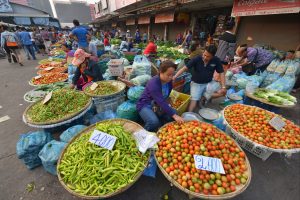The International Monetary Fund (IMF) has handed Laos a blunt assessment of its finances as inflation plateaus at 25 percent with its currency devaluing in kind amid public debt levels that require Chinese relief – and an asset sale that might go wrong.
In a recent report, the IMF found exchange rate depreciation continues and “inflation remains persistently high. Labor and foreign exchange shortages are intensifying. Public debt is assessed to be unsustainable, despite a tight fiscal stance. Foreign exchange reserves remain low.”
After reaching a record high at 131 percent of GDP in 2022, public debt fell to 116 percent in 2023 but this was mainly due to a rapid expansion of nominal GDP due to inflation, the IMF said. That figure is expected to fall to 108 percent of GDP this year but return to 118 percent in 2025.
The exchange rate fell by 140 percent between January 2021 and September 2024, underpinning inflation and the increase in the local currency value of public debt. Headline inflation peaked at 41 percent year-on-year in February 2023 before leveling out at the current rate.
The 112-page IMF report was based on studies and talks with Lao officials before its release under the “2024 Article IV consultation” in Washington earlier this month. As one would expect, the report is laden with IMF-speak.
Growth in 2023 is estimated at 3.7 percent and is projected to accelerate to 4.1 percent this year, driven mainly by industry and services. Tourism and the natural resource sector also performed well in 2024, it found. However, agriculture and electricity generation have been affected by drought.
Such growth numbers would be welcomed in the West but are considered low for a developing country and the IMF’s message was clear: the Laos economy remains in the doldrums and reliant on Chinese largesse, without a clear way out.
“Based on current conditions and policy settings, inflation and debt revaluation would likely intensify, implying a significant drag on growth over time,” it said.
It noted Lao’s current financial plan “critically relies on the continued extension of debt relief from China and, to a smaller extent proceeds from the asset sale” with a Thai renewable energy company, Energy Absolute Public Company Limited (EA).
That sale would enable EA to buy into a joint venture company named Super Holding (SH), specializing in the transition and rollout of electric vehicles, and was expected to provide the Lao government with $300 million this year and an additional $600-$700 million in 2025.
An agreement was signed in May.
However, the IMF pointed out the Thai Securities Exchange has accused the CEO and deputy CEO of EA of fraud and suspended trading in the company. As a result, the IMF “does not assume” the share sale will go through, leading to a 2 percent shortfall in GDP.
Meanwhile, the report highlighted substantial uncertainties clouding the economic outlook, including labor emigration, a decline in investment should exchange rate pressures exacerbate, increased pressure on the banking sector from deteriorating asset quality, and a continuing currency mismatch.
It also cited the potential for more frequent and damaging natural disasters while the external economic environment could also turn out to be less favorable, if growth in major trading partners turns out to be weaker than expected or commodity prices prove more volatile.
“Growth is projected to accelerate to 4.1 percent in 2024 on the back of recovering tourism, while inflation is expected to only decline moderately and remain elevated,” the IMF said.
“However, the large financing needs arising from the significant level of public debt poses challenges to the medium-term economic outlook,” it added, estimating that more than 80 percent of the country’s debt is external and denominated in foreign currency.
The report, which comes as no surprise to anyone who has been watching Laos’s economic crisis unfold, should be welcomed given the country’s perennial reluctance to publicly address its finances and its whopping spending spree on major China-funded infrastructure projects that it could ill-afford.
On this note, the IMF has repeatedly called for improved governance over the decades and in this report it said greater transparency, the consistent implementation of regulation and the tackling of corruption remain crucial to the country’s long-term economic health.

































